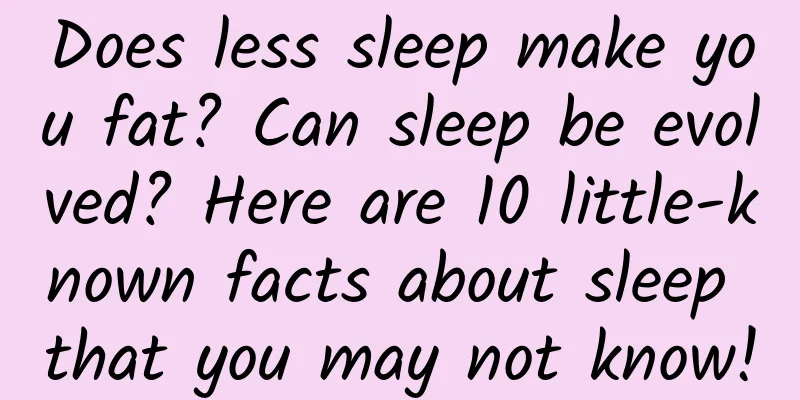Does less sleep make you fat? Can sleep be evolved? Here are 10 little-known facts about sleep that you may not know!

|
According to statistics from the World Health Organization (WHO), the global sleep disorder rate is as high as 27%, while in China, the incidence of insomnia among adults is as high as 38.2%. More than 60% of people born after 1990 feel that they do not get enough sleep, which means that more than 300 million people in my country have insomnia problems. In order to solve the sleep problem that troubles everyone, the Wanxiangyue team conducted an exclusive interview with Zhang Chenqian, the host of the 26th issue of Gezhi Lundao Bay Area and a psychiatrist at the Nanfang Hospital of Southern Medical University. The following is an excerpt of the key content of the interview. Q1. I often feel like crying like an emo. Does this mean I have depression or anxiety? Crying is a response to emotional stress. Everyone cries from time to time, and it’s completely normal. Anyone with depression is likely to cry frequently. Some studies have found that 43% of people with depression report “frequent crying.” For people with anxiety disorders, anxious crying can vary: it may occur rarely or frequently, seemingly at two extremes; or it may be intermittent crying that lasts indefinitely. People with bipolar disorder have highs and lows in their mood. Along with these unpredictable mood swings, people may have sudden outbursts, such as crying. Not everyone with bipolar disorder has the same ratio of highs and lows. If you think your emotional expressions are beyond the normal range or excessive, you should consult a medical or mental health professional. If you keep crying for no reason and it has affected your normal daily life, please seek professional help as soon as possible. Q2. Why do people easily suffer from emo insomnia at night? *The word emo comes from the English word emotional, which is extended to mean sad emotions such as depression and mourning. People all over the world are troubled by late night emo. So why is it that there are so few negative emotions during the day? This may be related to many factors. First of all, late night is indeed a time that easily causes emo. People's biological clocks make people accustomed to working during the day and resting at night, but the invention of electric lights has added a group of night owls to the world. Studies have shown that compared with early risers, night owls are more likely to have symptoms of depression and have lower subjective well-being. But this does not mean that the earlier you go to bed, the better. Studies have shown that individuals with disordered biological clocks, whether they are veteran night owls or extreme early risers, have an increased risk of depression. Another related factor is light. Weak light and blue light from mobile phones and tablets are likely to affect sleep. Studies have shown that low levels of light during sleep are associated with depressive symptoms in the elderly, while young people's eyes are more sensitive to light, and the risk of depressive symptoms caused by low levels of light (dim light) may also be higher. As for the blue light from mobile phones, a study published in 2020 showed that repeatedly exposing mice to blue light at night can cause symptoms of depression, and the electronic screens of mobile phones, tablets, computers, etc. that we often use emit this blue light that can cause depression. Other factors that cause late-night emo include fatigue accumulated from a busy day, loneliness and emptiness when alone at night, etc. In short, all kinds of things in life may cause us to emo at night. However, we can try to reduce the impact of late-night emo on us through some methods, and the best way to deal with it is to sleep! So next time if you realize that you are starting to feel emo late at night, try putting down your phone, turning off the bedroom light, closing your eyes and thinking about those warm things, which can make us fall asleep with a sense of happiness. As for the remaining emotions, your brain has a self-healing function and will handle them for you! Q3.What counts as staying up late? Some people think that staying up late means not sleeping after 11 o'clock at night, some people think that staying up late means not sleeping after 1-2 o'clock, and some people think that staying up late means not sleeping all night. In fact, none of the above belongs to the real sense of staying up late. In addition to having a regular work and rest schedule, you also need to have enough sleep time and quality. First of all, the definition of adequate sleep time varies from person to person. Some people need seven hours, while others only need four or five hours. Secondly, you must also ensure good sleep quality. Sometimes we find that a 20-minute nap can make us energetic in the afternoon. Another key to measuring staying up late is not how long you sleep, but whether you sleep enough. Even if you go to bed at 3 a.m. and get up at 11 a.m., as long as you keep this schedule every day and develop a fixed biological clock, it does not count as staying up late. Regular sleep does not count as staying up late, but if you go to bed late for a long time, it will still be very harmful to our health. Q4. What changes will long-term lack of sleep cause in appearance? Will lack of sleep make people fatter or thinner? Long-term insomnia can cause dark circles under the eyes, sagging and dark skin, increased wrinkles, eye bags, and other changes, making people look exhausted. In addition, it can also cause problems such as dry hair and hair loss, affecting image and self-confidence. When it comes to the relationship between weight change and sleep, the impact of sleep on weight has always been a controversial topic. Previously, the most recognized saying was "the more you sleep, the faster you gain weight." The theoretical basis of this statement is that sleep reduces metabolism, and energy is converted into meat. This statement seems to make sense, until recently more and more clinical studies have found that people who sleep less are more likely to gain weight. Dr. Van Cauter of the University of Chicago has been studying the relationship between sleep and diet for the past 30 years. The subjects were divided into two groups, one of which was the long-sleep group, which was arranged to sleep 8 hours a day for 5 days, and the other was the short-sleep group, which was only allowed to sleep 4-5 hours a day. It was finally found that the subjects in the short-sleep group showed a significant increase in hunger and appetite from the second day, and the short-sleep group also preferred to choose high-calorie foods. Q5. Is it more likely to cause dementia if you sleep too much or too little? In a study published in Brain in 2021, a research team from the University of Washington School of Medicine found that sleeping less than 4.5 hours and more than 6.5 hours a night (plus poor sleep quality) was associated with cognitive decline over time, which is one of the early symptoms of Alzheimer's disease. When it comes to the risk of dementia, the length of sleep is not necessarily the most important, but the quality of sleep. For example, the study also showed that less slow-wave sleep (restorative sleep) is particularly likely to affect cognitive impairment. Good sleep should be based on a regular schedule, with a sleep schedule of 6 to 8 hours. 85% of the sleep time should be spent in deep sleep; it is best to fall asleep within 30 minutes of going to bed; and the number of awakenings during sleep should not exceed once and the awakening time should not exceed 20 minutes. Slow-wave sleep is also called physical sleep. Restoring physical strength is mainly achieved through slow-wave sleep. If you monitor brain waves at this time, you will find that the brain waves change relatively slowly. Rapid-wave sleep mainly allows the brain to organize information. The brain can process information you don’t need and save and archive important information. Q6. Will taking too much melatonin, which is used to adjust jet lag and aid sleep, lead to dependence? Melatonin (Melatonin MT), chemically known as N-acetyl-5-methoxytryptamine, belongs to the indole class of tryptamines. Melatonin in the human body is secreted by the pineal gland and is called endogenous melatonin. Its synthetic raw material is mainly tryptophan, which has the physiological function of participating in regulating the human circadian rhythm and sleep. Melatonin secretion increases at night or when light is low, allowing people to gradually enter a sleep state. Adequate secretion allows people to fall asleep faster, reduce awakenings, prolong sleep time, and thus improve sleep quality. People who need to adjust to jet lag or work night shifts, such as night shift drivers, medical staff, and other night shift workers, can consider melatonin. Elderly people who are prone to sleep disorders due to insufficient melatonin secretion can consider supplementing with exogenous melatonin. Unlike sleeping pills, melatonin does not pose a risk of drug dependence or hangover when used normally. The safety of long-term use of melatonin has not yet been confirmed, but long-term use of exogenous melatonin may lead to a decrease in one's own melatonin secretion, and when it is discontinued, one's own secretion function may not be restored or partially restored. Moreover, the vast majority of insomnia is not caused by disordered or reduced melatonin secretion. At this time, the use of exogenous melatonin cannot effectively improve sleep in a timely manner. Melatonin is ineffective in initiating sleep for people with sleep disorders. It is only used to deepen sleep, that is, it cannot help people fall asleep. It can only improve sleep quality and has no positive effect on intractable sleep disorders. Once long-term and large-scale use of melatonin forms dependence, it will cause sleep dysfunction and aggravate insomnia, so long-term use is not recommended. Patients with sleep disorders should choose reasonable sleeping pills in a timely manner under the advice of a doctor. Q7. Working out late at night, taking walks in the early morning... Netizens joked that Koreans have evolved their sleep patterns. Can one really train oneself to not need sleep? Our sleep is actually regulated by the sleep homeostasis mechanism and the biological clock. The sleep homeostasis mechanism determines whether a person is active in the morning or at night, which means that some people are morning types (people who are easily excited in the morning) and some people are night types (people who are easily excited at night). The biological clock refers to a 24-hour cycle from day to night, which can be affected by factors such as light, exercise, eating, and body temperature, and determines your sleep state. These two systems interact with each other and jointly affect when we sleep, how long we sleep, and how well we sleep. In these two regulatory mechanisms, a gene called DEC2 is regulated by the biological clock. The protein it expresses is a transcriptional repressor that can inhibit the core regulatory elements of the biological clock, thereby affecting the duration of sleep. Therefore, those who sleep less but are in good spirits may have this gene at work. Everyone has different needs for sleep, so don't worry too much about it. Just follow your own habits and there is no need to practice deliberately. Q8. “White noise” is known as a sleep aid. Is it science or hoax? White noise refers to sounds with a relatively fixed frequency. In daily life, the sound of rain, waves, insects, etc. are all white noise. This monotonous and regular sound can make the brain quiet and less active, which in turn makes people feel tired and sleepy, and even drowsy. However, the reason why white noise helps people sleep is not because of itself, but because it can block out other noises. Most insomniacs feel that they are very sensitive to sound before going to bed and at night. They will have difficulty falling asleep or wake up suddenly at the slightest noise. White noise is less disturbing to people and can cover up other noises. Therefore, when listening to white noise, people will immerse themselves in a single sound environment and ignore other factors, so they can fall asleep quickly and wake up less easily. However, the sleep-inducing effect of white noise varies from person to person. It is generally believed to be most effective for infants, and may not be of any use to people with severe anxiety. When turning on white noise, you should try to keep the volume as low as possible, and adjust it to a level that can cover the surrounding sounds. If the headphone volume exceeds 60 decibels for a long time, it will damage your hearing. Q9. Which position makes it easier to fall asleep: lying on your side or lying flat on your back? Choose a sleeping position that suits you according to your physical condition. Sleeping on your back is more suitable for most people, but it is not recommended for the elderly and overweight people, as they are prone to snoring and may cause apnea. There are two types of side sleeping, either on the left or on the right. There are differences in different directions. When sleeping on the left side, the pressure on the heart is relatively large. If the heart function is not very good, it is best not to sleep on the left side. Sleeping on the right side is better. There is no pressure on important organs. You can also put a pillow between your knees to reduce the pressure on the spine. At the same time, the curled-up posture can also give a sense of security and help you fall asleep quickly. If you have heart disease or snore, you can sleep on the right side. It is the best way. Insomnia patients do not have too many requirements for sleeping positions, as long as they feel comfortable. The first priority is to fall asleep first, and then consider the sleeping position after the sleep disorder is relieved. If you force yourself to sleep on the right side, it may aggravate the insomnia symptoms because your body is not used to it. Q10.Can dreams reflect a person’s subconscious mental state? Dreams are a manifestation of brain activity during sleep. When we fall asleep, the brain remains active, processing and integrating various information. These processes may produce dreams. In dreams, we may experience some scenes, emotions or memories related to daily life, which are all subconscious information expressed in dreams. People with better sleep quality are more likely to enter the rapid eye movement (REM) sleep stage, resulting in more dreams. On the contrary, people with poor sleep quality may not enter or rarely enter the REM stage, so they have fewer dreams. Negative emotions such as stress, anxiety, and depression may lead to an increase in dreams. These emotional states affect the activity patterns of the brain, making it more likely to produce dreams. Some people have rich experiences and rich memories, and they may reflect more scenes and plots in their dreams; in contrast, people with relatively monotonous experiences or fewer memories may have fewer dreams. People who are more sensitive and imaginative are more likely to express their subconscious in dreams, so they dream more frequently. Some studies have shown that there is a correlation between dreams and creativity. People who dream more may be more creative and can get inspiration and creativity from their dreams. In short, dreams are a form of expression of human thinking and consciousness, and everyone has the experience of dreaming. The cause of dreams can be attributed to brain activity and subconscious expression. Individual differences are an important reason for differences in dream frequency, including sleep quality, psychological state, experience and memory, and subconscious activity. There is no absolute good or bad difference in dream frequency. Everyone can better understand their inner world by appreciating and thinking about dreams. Guest Profile Zhang Chenqian Doctor of psychiatry at Nanfang Hospital of Southern Medical University, expert in emergency intervention of psychological crisis in Guangdong Province, and PhD of Psychiatry Department of Faculty of Medicine of The Chinese University of Hong Kong. Mainly engaged in clinical research on sleep medicine, affective disorders, cognitive impairment, etc. Published more than 10 papers in domestic and foreign journals (7 SCI papers as the first author), 2 of which were selected as ESI highly cited papers (1 as the first author). He has successively presided over the National Postdoctoral Program, Guangzhou Science and Technology Project, etc., and participated in the National Key R&D Program as a backbone of the project. He was a guest speaker at the 6th Gezhi Lundao Bay Area to popularize sleep health knowledge. Copyright notice: All images in this article are from the VEER copyright library. |
<<: Deep within the Earth, there are the remains of an ancient planet
Recommend
How do locusts find mates? Scientists have figured it out
Produced by: Science Popularization China Author:...
Kaili SEO Training: Does SEO keyword layout have a big impact on rankings? Will it cause rankings to fluctuate?
Keyword optimization can improve the ranking of k...
TrendForce: The world's top ten IC design companies will have a revenue of US$249.8 billion in 2024, with Will Semiconductor ranking ninth
The latest data from market research firm TrendFo...
How to avoid remote work failures: DingTalk, WeChat for Work, or Lark, which one is more suitable for you?
The COVID-19 pandemic has brought online office w...
Shi Dakai left in anger, taking with him 100,000 Taiping troops, bringing "catastrophic disaster" to the Taiping Heavenly Kingdom.
The "Tianjing Incident" that occurred i...
Brand Marketing: 4 Characteristics of Event Planning Points!
Once there is an incident and a discussion, a fir...
The peels of these 5 fruits are very nutritious, but you throw them away!
Do you usually peel the fruit before eating it? M...
Analysis of 5 aspects: pain points and opportunities in mutual finance operations
There don't seem to be many articles on Inter...
The product logic behind the epidemic topics of Toutiao, WeChat, and Alipay
In January 2020, at the beginning of the Chinese ...
With the support of security chips, Android data encryption is becoming increasingly difficult to steal
Background of Android FBE In this article, we wil...
Qingyi hits the board master + CJ low-absorption master hot money actual combat combination punch Qingyi hits the board + CJ low-absorption
Qingyi hitting the board master + CJ low-absorpti...
Langji Education Dayao "Jane Eyre" video course
Dayao's Jane Eyre introduction: The appeal of...
Why do you always want to eat even though you are not hungry? The answer is not as simple as you think...
Expert of this article: Zhao Wei, deputy chief ph...
The seasoning used by every household is said to cause cancer and Alzheimer's disease when eaten? Listen to what Huaxi doctors say!
Recently, with the explosion of "Technology ...
The secret to healthy running: How to take every right step?
Review expert: Peng Guoqiu, deputy chief physicia...









